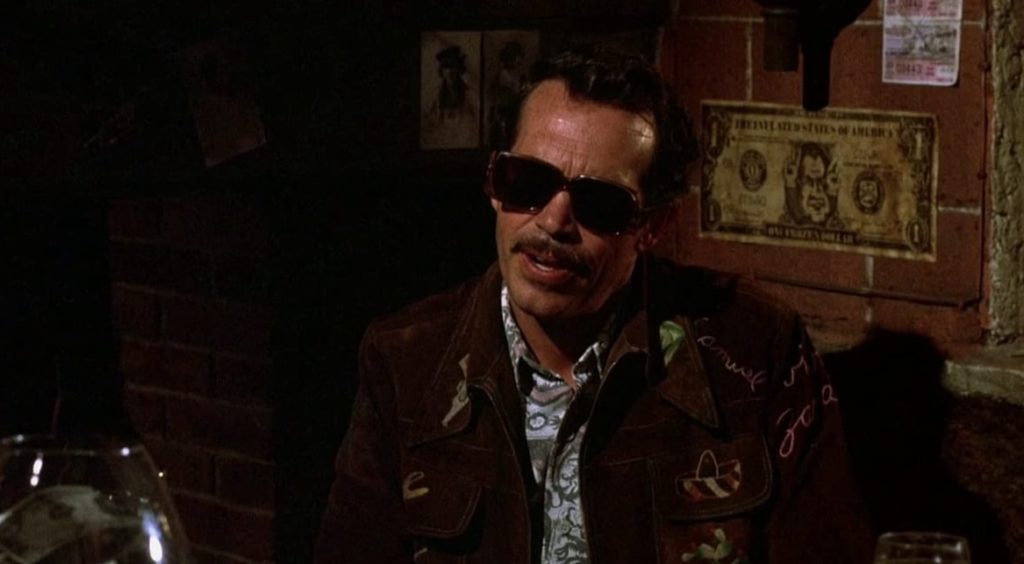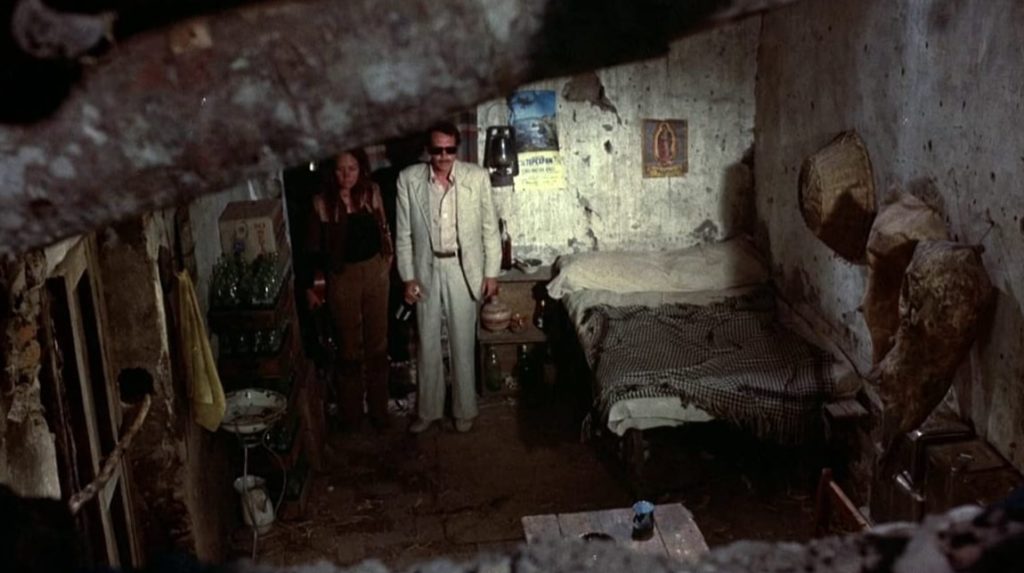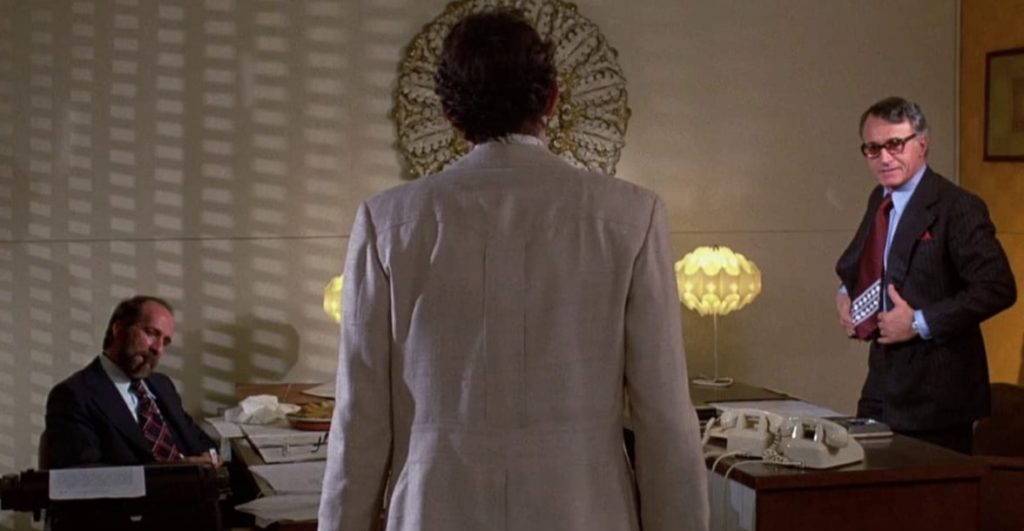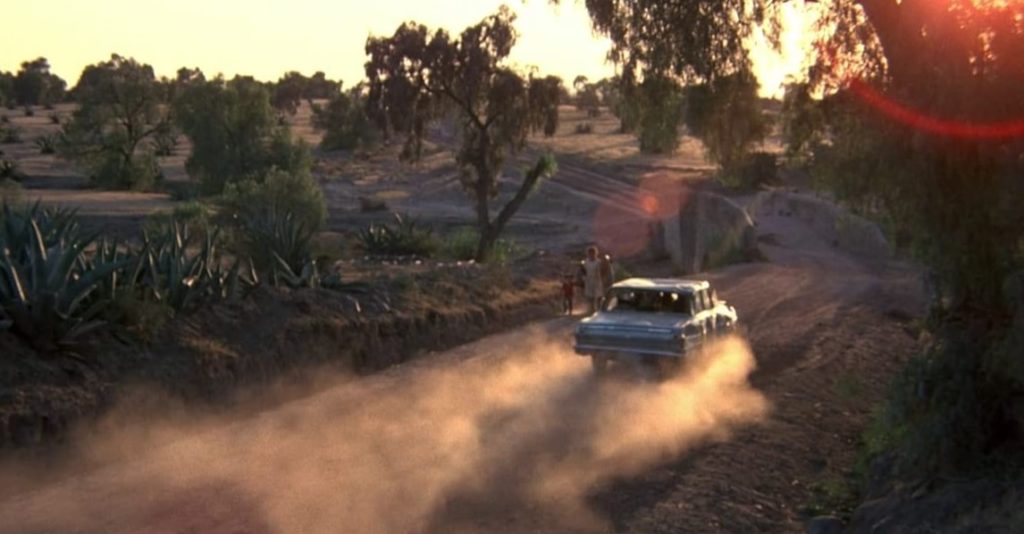| Sophie Durbin |

Bring Me the Head of Alfredo Garcia plays at the Trylon Cinema from Friday, May 5 through Sunday, May 7. Visit trylon.org for tickets and more information.
Warning: plot spoilers below!
Bennie (Warren Oates) drives across the Mexican countryside in a sweaty white suit stained with blood and dirt. Gasping for air, he swats flies from his passenger, a decaying human head in a burlap sack. He’s speaking to the head as if it’s the most normal thing in the world. He never finds relief, and neither do we. This is the sensory landscape in which we find ourselves in Bring Me the Head of Alfredo Garcia.
The plot is simple. Alfredo “Al” Garcia, whom we never meet alive, impregnates Teresa, the daughter of a crime lord known as El Jefe. El Jefe puts out a bounty on his head, literally. Bennie, who plays piano at a seedy bar in Mexico City, learns that Al had an affair with his girlfriend Elita (Isela Vega) before dying in a car accident. He accepts an offer from El Jefe’s hit men to find and return Al’s head. Nothing about the road trip that follows goes right. Bennie and Elita are accosted by bikers (including Kris Kristofferson in an unsettlingly sensitive performance as a would-be rapist). When Bennie cracks open the coffin at Al’s burial site, they are attacked by rival grave robbers and Elita is killed. Bennie carries on from there as he slowly loses his mind and whatever sense of purpose he felt when he began his quest.

I always wanted to see this film, if only for the commanding title. After finally watching it for the first time in 2018 at the Trylon, a fellow audience member dryly observed that the film “really put in perspective how unpleasant it would be to drive around with a human head.” It’s true. From the moment Bennie rescues the head from his rival grave robbers, he begins to suffocate. Both the smell and the power of its presence are intolerable to him, but he cannot disentangle himself from it: the head is his final earthly connection to Elita. Bennie carefully ices the head and converses with it like a friend, forming a posthumous truce. He seems to think that finishing the job will give some meaning to his grief. Al is dead, but he manages to control the narrative from the grave. When El Jefe demands for the head to be tossed to the pigs in the end, Bennie truly loses it, and as he drives away with his companion, he is shot. Al’s child is presumably among the only survivors of the shootout. Again, even in death, Al seems to be the only one in the story that comes out on top.
The emotional impact of the film is more of a surrealist play than a guns-out neo-western. Sam Peckinpah punishes his characters with cruel irony worthy of Oedipus Rex, and it is a masterful tragedy full of disjointed parallels and opposites. “We were saying goodbye,” Elita confesses of her affair with Al. It turns out the whole road trip, which begins with Elita and Bennie carefully mending their relationship, is one drawn-out goodbye before Elita and Al reunite for good. Bennie agrees to marry Elita in the town where Al was buried, but when he leaves, Al has perversely won Elita’s hand: she is entwined with his headless corpse in his desecrated grave. The most sinister scenes all happen in sacred spaces, building a link between spiritual tradition and violence. In the beginning, Teresa is forced to the ground during a private church service at El Jefe’s estate, her dress ripped off her pregnant body. In the end, her child’s baptism becomes a bloodbath. The film is filled with imagery of cleansing and bathing, foreshadowing the violence at the baptism. Teresa suns herself by a pond. Elita cleans at a motel and later plunges herself in a shower at their sordid accommodations in the town where Garcia is buried. Bennie bathes Al’s rotting head at his apartment. These attempts at cleansing are futile, because every character is eventually dirtied by the plot El Jefe sets in motion.

Within this brutal sensory overload we find scenes of heartbreaking and even hysterical intimacy. When Bennie discovers he’s contracted crabs, he douses his crotch with booze, repulsed. But he cannot be mad at Elita when he confronts her in bed and they collapse into a giggling embrace. I can see why Bennie loves her, why he forgives her immediately for her affair: she speaks openly and gently to him, even about things that will hurt. Her singing voice is ragged but tuneful. At their picnic by the road when Bennie finally tells Elita he would like to marry her, a single tear of relief runs down her cheek. He refers to her as his wife a few times as if he’s testing out the word. In their glances, we see the jolt of butterflies they feel each time he says it. When Bennie cradles Elita in the shower after her attack and tells her he loves her, the camera catches his gaze from Elita’s point of view, making the audience share in her pain and comfort. He looks almost directly into the lens and the moment feels so private that I feel I’m watching something I shouldn’t have access to. The chemistry between Warren Oates and Isela Vega feels real, like Peckinpah left the camera rolling after discovering that they were having an on-set affair (though they weren’t, to my knowledge). These moments are achingly sweet. Knowing what’s coming for Bennie and Elita, seeing them care for each other is more unbearable than any of the violence that happens later.

Pauline Kael was unimpressed by Alfredo Garcia and argued that the “the director seemed to have run out of energy after a virtuoso opening.” Never one to mince words, she also criticized Oates: “Oates is a man who’s used to not being noticed, and his body shows it.”1 I agree. But for me, this is what makes Oates’ performance work so well. He is disarmingly vulnerable and a perfect choice for a character who has taken on a mission so disproportionate to his own ability. To watch him in this desperate state is a gift. He inspires in me an explosion of feelings: I want to hold his head in my lap as he cries, I want to buy him a drink, and when he opens fire on El Jefe, I want to be him. When the movie ends, I’m sad I won’t be able to meet him. The inevitable violence and death pervading the film does lead to a stifling atmosphere, which to some may be the lack of “energy” that Kael recognized. For me, this atmosphere is a challenge worth withstanding—an ambience that mimics the stifling stench of Bennie’s car. The credits roll against a backdrop of stills from the film, little souvenirs of the piercing blue skies, dusty roads, blood, sweat, and grime I’ve had the privilege to be submerged in for the past 112 minutes.
NOTES
1 Kael, Pauline. “Notes on the Nihilist Poetry of Sam Peckinpah.” The New Yorker (January 12, 1976). https://scrapsfromtheloft.com/movies/killer-elite-review-pauline-kael/
Edited by Olga Tchepikova-Treon
